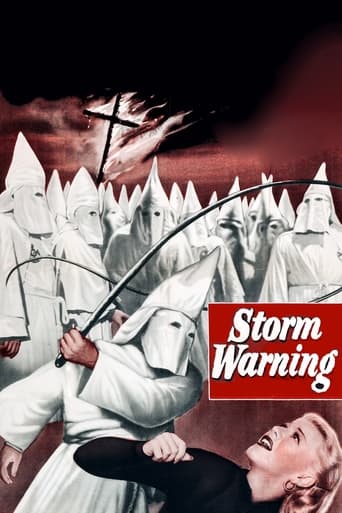secondtake
Storm Warning (1951)An anti-KKK film that doesn't mention blacks or Jews or other persecuted groups. Instead, the victim is a journalist who we assume was uncovering those crimes. The drama is high, the filming dramatic with lots of night stuff (some of it daringly dark), and the leading actors very good.The star here is Ginger Rogers, and she pulls off a subtle job of being both a very strong woman and an average American unwilling to stick her neck out. In a way, that's the one main point of the movie--that the KKK continues in little towns in mid-century America because regular people who are normally models of fortitude decide to just look the other way.Doris Day and Ronald Reagan, both archetypes of some kind of social conservatism later in their careers, play ordinary folk here. Day is the wimpy sister who happens to be married to a lousy klan bruiser. She plays the weak American, you might say, who protects her man even when he's obviously murderous. Reagan is the easy going prosecutor--and he's easy going in the way he'd later be the easy going president. He gets things done by slowly and cheerfully persisting.Director Stuart Heisler made a number of hard edged movies in his career, including one of my favorites, "The Glass Key." But, as in many of these others, he goes for style over substance here. You might say the American public wasn't ready to face their ambivalence over the KKK head on, and that the studios skirted the issue and were brave for bringing it up at all. Well, reviews from the period say otherwise. They call the movie wimpy and elusive, and it is.What you do get is a series of really good but really familiar situations where the KKK members coerce and force the regular townspeople into going along with their evil ways. There is no mention at all of the what the KKK was against, or the racism that was at the heart of the issue nationally. There are, to be sure, several black actors as extras in a couple of scenes, but this is hardly relevant except to say that the opportunity was there to push the issue much harder, much harder. Even Warner Bros. own "Black Legion" from 1937 (and starring Humphrey Bogart) was better at making the issues pertinent. "The Intruder" from 1962 (and starring William Shatner) is better at getting to the point despite its low budget, and maybe shows how the country was dealing with the issue more openly by then."Storm Warning" is so well made and filled with great scenes--both the small town settings and the wild KKK meeting in the woods--it's worth seeing. And the opening ten minutes is so creepy it will really make you perk up. They say Rogers is miscast here, but I think she was supposed to be the sophisticated outsider who might, in fact, stand up for justice. And then she doesn't. See it.
billdower
Storm Warning is a real curiosity in terms of its casting – dancer Ginger Rogers, one time favourite partner of Fred Astair, and Doris Day, who went on to become America's favourite virgin/mum-next-door in light-weight comedy movies (while simultaneously achieving world-wide success as a singer), are cast a sisters in a film noir with no singing and dancing but scenes of murder, attempted rape, ritual scourging and domestic violence! Billed as an expose of the Ku Klux Klan the movie has been slated in some quarters for shying away from the real issues: no mention of the racism and sectarianism for which the loathsome organisation is infamous, no black faces in the crown scenes, no real idea of the location of Rock Point, the fictional town where the action is set – all that is explicitly stated is that it isn't New York! The film opens with Ms Rogers, on the way to a marketing assignment somewhere outside of the metropolis, stopping off en-route to visit her sister in small-town USA where, as misfortune would have it, she witness the murder by Klansmen of a 'meddling reporter'. Later, on meeting her sister's husband (Steve Cochran) Ms Rogers recognises him as one of the murderers. For the sake of her sister, who has just discovered she is expecting her first child, Ms Rogers lies at the court hearing claiming she saw nothing, therefore denying county prosecutor Ronald Reagan (yep, the one that became President) the chance of issuing subpoenas to every member of the local Klan chapter in pursuance of a prosecution. Through Ronnie's dialogue and that of the chief clansman and local employer, the film does indeed seem to portray the Klan as a bunch of hoodlums, thugs and petty gangsters whose main crime seems to be evading income tax ¬– as opposed to a quasi-religious organisation hell-bent on spreading hate, distrust and violence. While this does seem to indicate the studio back peddling on its intent to rip aside the veil of mystery surrounding the Klan, there is some truth in the description of its members. If the Klan only attracted law-abiding citizens and fought for its anti-Jew/catholic/black agenda through the ballot box it would be a laughing stock. The fear-inspiring fact of the matter is that this type of hate-fuelled organisation tends to attract hoodlums and thugs who aspire to violence and lust for power. Society can deal with and dismiss the ill-thought-out philosophies of these fringe organisations but it is more difficult to deal with the law-breaking, violent acts which take place in the dead of night perpetrated by cowardly gangsters who hide their faces. Made in 1951, Storm Warning, was the first movie to feature the Klan in such a negative fashion. It is hard-hitting in number of ways – while much of the action seems a little tame to the jaded audiences of 21st century, particularly the domestic violence perpetrated by Hank Rice (Steve Cochran), which is a mere shadow of that of Marlon Brando's Stanley in A Streetcar Named Desire, the scene were Ms Rogers actually vomits in the street having just witnessed the murder remains particularly shocking! While this Warner Bros production falls well short of the studio's best fare there are great performances from the leads and it is a pity the movie is so hard to get hold of – I had to get mine from a guy in Madrid!
LouisaMay
For those who feel the film wasn't ardent enough in its attack on the Klan, I wanted to point out that in the early 50s the hot button issue of the day was organized crime and the mafia. Many, if not most, Americans at that time shared racist and anti-semitic attitudes, and attacking the Klan on those grounds would not have had the effect it would have now. By positioning the Klan as an organized criminal gang,the filmmakers denied the Klan their ideological purity and their claim to 'cleaning up' communities. For those who protested the lack of Southern dialect in the film, you need to know the Klan was not uniquely Southern: it originated in Indiana and flourished up North as well. To this day white supremacist organizations are based in the North, and the two most segregated cities in the U.S. are Detroit and Chicago. Not limiting actors to a Southern dialect widens the perception of the problem. I'm not a Southerner, but I do think we need to be fair about this.
zeppo1-2
The first 30 minutes of this film are riveting, owing primarily to Ginger Rogers' subtle and restrained performance. She doesn't have much dialog but emotes with body and expression beautifully. The level of tension is palpable. Sadly, that dissipates as the movie rolls on, until the ending where Ginger is in real danger. And, although the many objections that people raise here are not without merit, including the compressed time of the inquest, the lack of continued menace from "the Klan", the odd location setting, I still have to say that this is one of my new favorite movies. There are a lot of subtleties that add to the film.And, it's nice to see Lloyd Gough (who played Mike Axeford on the 1966 Green Hornet TV show) trying to pick up Ginger on the bus.




